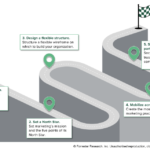Wondering whether improving customer experience will improve your business results? It will. Forrester’s State Of Customer Obsession Survey, 2024, shows that focusing on the customer reduces costs, increases purchase frequency, and mitigates customer churn.
But don’t forget to turn your gaze outward, beyond your company walls (solid or virtual). Customer focus supports reputation, too.
Decision-makers at B2B companies chose “improved our brand reputation” and “increased the percentage of customers who say positive things about us” as the top two benefits of improving customer focus. This is important: Forrester’s research has long indicated that reputation is a strong influence on purchase decision-making. For example, recent data from Forrester’s Buyers’ Journey Survey, 2024, puts customer references among the top five self-guided sources of information for the “discover” and “evaluate” stages of buyers’ journeys.
If Buyers Care About Reputation, Help Customers Support Yours
The formula is straightforward:
- When you focus on customers, you’re more likely to make them successful.
- Successful customers tell others about their experience.
- Their stories improve your reputation among potential buyers, influencers, and other customers.
- That leads to more opportunities, more wins, and more revenue.
Creating an experience in which customers attain value from the relationship and are successful using your offering is part of the reputation equation. To ensure that those successful customers are ready, willing, and able to provide references and success stories to support your brand, invest in strategic customer advocacy.
Customer Advocacy Is A Two-Way Street
Strategic customer advocacy means moving beyond the one-way street in which you ask for a reference, referral, or testimonial, and the customer complies (if they have time). Instead, build the relationship.
- Identify and motivate advocates by managing your requests and acknowledging their loyalty.
- Build trust: Forrester’s Business Trust Survey, 2023, shows that customers who trust a company are far more likely to recommend the company internally and externally.
If you view customer advocacy strategically, and resource accordingly, you’ll build a group of customer advocates who will recommend you to prospects, peers, and influencers — sometimes, before you even ask.
The Forrester Customer Advocacy Model is a starting point to create or expand your advocacy program. Our research supports strategy, planning, execution, measurement, and technology choices for advocacy. Reach out and let us help you help yourselves … and your customers.








